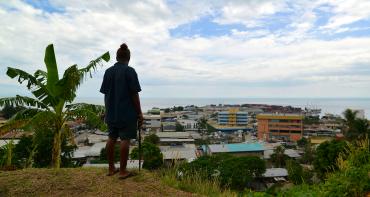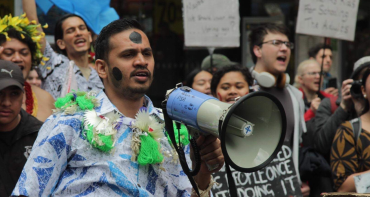Seychelles’ Minister of Finance, Trade and Blue Economy Jean-Paul Adam drew the Fourth Global Biennial Conference on Small States to an end by calling on all delegates present to be global activists.

Seychelles’ Minister of Finance, Trade and Blue Economy Jean-Paul Adam drew the Fourth Global Biennial Conference on Small States to an end by calling on all delegates present to be global activists.
“Use your activism for initiatives dear to all our economies,” he said.
The Minister’s words resonated with the many ideas and actions put forward over two days, as high-level officials, young people, civil society and other representatives from 18 Commonwealth small states came together to confront the realities facing this vulnerable group of countries.
Joined by major international development partners, the IMF, World Bank, OECD and United Nations, participants tackled a wide range of topics from financing for development to climate change. Presentations on crowdfunding, protecting the ocean economy, accessing affordable financing and a vulnerability resilience framework were among the many contributions that triggered debate.
Today’s discussions focused on financing development goals. As pointed out by the moderator, Sibry Tapsoba from the African Development Bank, “Now you’ve had all these great ideas, let’s talk about how we’re going to pay for them”.
Highlighting the huge potential of crowfunding, Peter Baeck from Nesta, a UK-based charity supporting innovation, presented success stories of development financing. Peer-to-peer lending, he said, is becoming increasingly popular, as he noted that in the UK it now accounts for three per cent of the loan market.
“This is about bringing communities together and getting them to give money. Crowdfunding originally grew out of the creative industries but it has now perforated all sectors. We are looking for ways people can give and donate money in the same way they spend their money,” he said.
As acknowledged throughout the conference, small states struggle to access affordable financing, and for many small countries that have high debt levels, huge interest payments drain resources. Initiatives, like crowd-funding have the potential to unlock new affordable financing and catalyse economic growth in theses countries.
One initiative that grew out of the Commonwealth leaders’ summit in 2013 – the Commonwealth Green Financing Fund – promises to step up to the plate and help out with smaller-scale environmental projects. Justin Mundy, the co-chair, explained the fund will “help to fill a gap” by offering cost-effective guarantees for green projects that would ordinarily struggle to get funding.
Speaking on behalf of the host country, Rebecca Loustau-Lalanne from Seychelles’ Ministry of Trade Finance and the Blue Economy spoke about the country’s groundbreaking plans to launch a blue bond. Based on the same principle as green bonds, which use debt market capital to fund climate change projects, she noted the blue bond would generate significant revenue to create viable and sustainable fisheries, a major provider of food and livelihoods for a large percentage of the country’s population.
“We are a large ocean state transitioning to a sustainable blue economy. This needs to be a socially inclusive process bringing in all sectors. We are synergising development tools to ensure better outcomes for everyone,” she said.
Drawing the meeting to an end, Seychelles’ Minister Adam stressed the need to move away from measuring small states’ economies by their gross domestic product and focus on vulnerability as the key criteria. “We need to explicitly link the Sustainable Development Goals with issues of vulnerability,” he said.
“We need to be talking about small states every day for the planet. The planet is not complete if we cannot ensure development space for our smallest members,” he concluded.
The conference’s outcome statement, which contains practical actions to build the resilience of Commonwealth small states, will be issued early next week.



